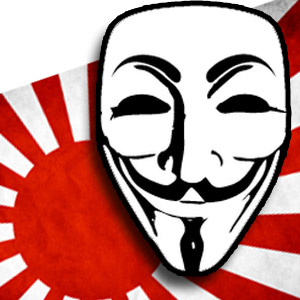 NEWS
NEWS
 NEWS
NEWS
 NEWS
NEWS
![]() Not to sit idly on their collective Guy Fawkes masks, Anonymous has found a new target to harass for violating their sense of information ethics: Japan. The websites of Japan’s Finance Ministry, Supreme Court and political parties DPJ and LDP were taken offline briefly by the hacktivist collective; also a number of the Finance Ministry’s web pages had been defaced on Tuesday and an unauthorised link posted on the site.
Not to sit idly on their collective Guy Fawkes masks, Anonymous has found a new target to harass for violating their sense of information ethics: Japan. The websites of Japan’s Finance Ministry, Supreme Court and political parties DPJ and LDP were taken offline briefly by the hacktivist collective; also a number of the Finance Ministry’s web pages had been defaced on Tuesday and an unauthorised link posted on the site.
A Twitter feed connected to the Anonymous collective, @op_japan, announced the claim of their involvement–all this in protest of a new anti-piracy bill that posits jail time for copyright violations in the island nation.
The Twitter account appears to come along with a hashtag “#OPJapan” which fits the common nomenclature of Anonymous attacks as “operations” or “ops.”
The BBC news site caught quotes from Ministry official Takanari Horino saying, “We are aware of the Anonymous statement referring to the new copyright law, but we don’t know at this point if the cyber-attacks are linked to the group.”
A statement on the website believed to be run by members of Anonymous, anonpr.net, said anti-piracy bills passed last week in Japan would do “little to solve the underlying problem of legitimate copyright infringement”.
“The content industry is now pushing ISPs [internet service providers] in Japan to implement surveillance technology that will spy on… every single internet user,” it added.
“This would be an unprecedented approach and severely reduce the amount of privacy law abiding citizens should have in a free society.”
Anonymous has a somewhat sore spot for the media industry when it comes to their anti-piracy efforts, especially when those efforts tend to censor or lend a chilling effect on information culture. Although the collective is not always very smart about how they deploy their weapons of mass disruption—in May, The Pirate Bay admonished the collective for DDoSing customers of ISPs that were blocking the torrent tracker in protest of the same block.
The forced closure of Megaupload.com spawned one of the largest DDoS attacks by Anonymous against numerous targets (including Time.com.) The would-be national anti-piracy and censorship treaty the Anti-Counterfeiting Trade Agreement (ACTA)–which is taking a lot of heat across the national theater–drew fire down on the U.S. government’s Federal Trade Commission websites. Even Turkey hasn’t been left untouched for cutting off Internet to its citizens in 2011 in the name of “protecting them,” which drew criticism, data leaks, and website defacement from Anonymous to the country’s government.
As a whole, Anonymous reacts to oppressive governments and censorship with a heavy hand. It appears that Japan’s anti-piracy bill fits the trigger that would bring them out of the woodwork, the new law accords that “downloading of copyrighted works knowing that they are not free and that it is illegal” and could bring with it a fine of 2 million yen ($25,300; £16,184) and/or a prison sentence of up to two years.
Seems a little steep for simple digital copyright infringement.
Support our mission to keep content open and free by engaging with theCUBE community. Join theCUBE’s Alumni Trust Network, where technology leaders connect, share intelligence and create opportunities.
Founded by tech visionaries John Furrier and Dave Vellante, SiliconANGLE Media has built a dynamic ecosystem of industry-leading digital media brands that reach 15+ million elite tech professionals. Our new proprietary theCUBE AI Video Cloud is breaking ground in audience interaction, leveraging theCUBEai.com neural network to help technology companies make data-driven decisions and stay at the forefront of industry conversations.